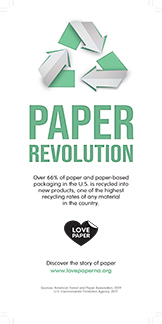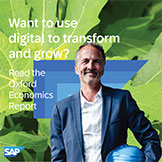What's better for society, culture, or an economy - thousands of local retail shops owned and operated by individuals and families or large corporate stores? Personally, I used to love to visit my now-defunct community hardware store for that screw I needed or a better plunger since gallons-per-flush on modern toilets has been governed. Now I feel helpless and soulless walking through a massive hardware retail chain taking too much time to find what I need while being barraged with opportunities to buy more things than I need. Is a more apt comparison for Nip Impression readers a small, family-run paper mill (usually multi-generational) versus the corporate mill? I had mentioned the customer composition of my first sales territory in a previous column and haven't been able to stop thinking about it since writing those words. As much as I loved the 120" Fourdrinier paper machine run with a bunch of overweight men pushing buttons, reading pneumatic charts, and beating the reel with sticks, the future is clearly the technical marvels that are being built today that can consume acres of trees every minute. The Beetle is replaced by the Model X.
I have seen the small vs. big comparison in every industry category where I have worked in on the commercial side, which is uniquely broad. Not just the manufacturing customers either, but the suppliers of products and services too. How does company size impact innovation, customer loyalty, employee loyalty, pricing, quality, or longevity? Then there is the question of why the economy promotes bigness and the need to grow not only in regions, but globally? There is no way to address all these questions in a thousand words, but I do have a few big thoughts.
Publicly traded corporations, in my opinion, are a magnificent development in that they allow individuals to build stakes (i.e. assets/wealth) through share purchases in what historically was an exclusive club of robber barons, i.e., already wealthy titans. These stock purchases are also a way of "voting" what product, brand, or service is most beneficial to the economy or most efficient in its money-making endeavor. However, benefit of fractional share accumulation in a liquid stock market for individuals still leads to fewer choices as a consumer as it provides the capital needed to consolidate market players. I'm no fan of Karl Marx, but he was right in the observation that capitalism will lead to monopolies. You might say that laws are there to keep that from happening, but ask yourself who writes the laws? Are politicians working for voters, donors, or themselves? Cui Bono?
Realistically speaking, everyone wants to grow to garner a "happier" life as society has ingrained in our minds. For those content with their station in life, the US monetary and fiscal policy forces you to grow (be it a person or firm) because if you don't, your wealth if held in dollar savings is confiscated at a rate of 2-7% every year. They usually tell you its 2% when those paying bills know its 7%. That's historically speaking...it's even worse now as we all know. And when invested capital grows and the gain is realized you get another bill for 20%. Even if it is a pet rock or computer puzzle growing in value with no real change in its makeup or utility... racket that makes the Cosa Nostra blush. Own a mortgage-free home? You only think you do. You're re-buying it every 40-50 years through ever-escalating property tax.
Growing big is not the end-all be-all it appears to be. Just look at the DOW JONES industrial index. Wow, it's grown from 50 to 37,000+ in its history. Most of that is vapor as the dollar is not what it used to be (only 1/100 to be more exact.) I would also contend that it is actually ZERO because none of the original companies in the original DJI still exists. The game is to constantly swap out DJI components to reflect the "current" market. So the biggest of the big don't stay that way over long periods of time. That's because they don't adapt. Innovators dilemma. Clayton Christianson, Jim Collins, and Tom Peters wrote often about these concepts.
I once had the C-level executive of a Fortune 50 fast moving consumer goods company tell me adopting a new supply chain model to match supply with demand in real time instead of warehousing forecasted volumes was not realistic because of the infrastructure already in place. Not even worth a discussion of how to slowly implement. Hmmm. Don't rock the boat, get to retirement...I certainly get it. The future does belong to the young. I like selling ideas to the younger generation for this very reason.
I see an economy like nature, where diversity promotes the survival of the fittest, or more appropriately, the most adaptable to changing environments. Species die off all the time - even big ones. Millions of species have gone extinct throughout earth's history of organic life. Don't confuse natural diversity with forced diversity though. Programing through anything but merit is nothing but a race to extinction. Forced diversity is a good way to stoke discontent if that is your goal. Just sprinkle a little evasive species in a natural forest and see what happens. Write laws to cut down large trees to provide light to shrubbery and ground cover - how will that work out?
Innovation is survival for the small(er) companies. Customer service is critical too as that nurtures communication that feeds the innovation pipeline. There's no other way to compete with scale in a price/cost driven and risk-adverse world. You had better know how to solve problems, create new and novel technologies/methods/products, or meet the needs of your customers better than the competition. Yes, the psychology of branding ("nobody gets fired for choosing IBM") can tilt those results for a while. However, in an economic battlefield, even brands go extinct too. Scale certainly has its benefits and can't be ignored. Yet, scale is rigid and brittle, so innovation is critical in those environments just as much as those individuals and entities looking to become big too. Growing revenues is hard work, especially the bigger you become.
Steve Sena (stevesena@me.com) is a Cincinnati native. He obtained degrees in Paper Science & Engineering from Miami University in Oxford, OH and an MBA concentrating in Economics from Xavier University. He's worked for a broad array of leading producers, suppliers, and converters of pulp and paper grades.






















